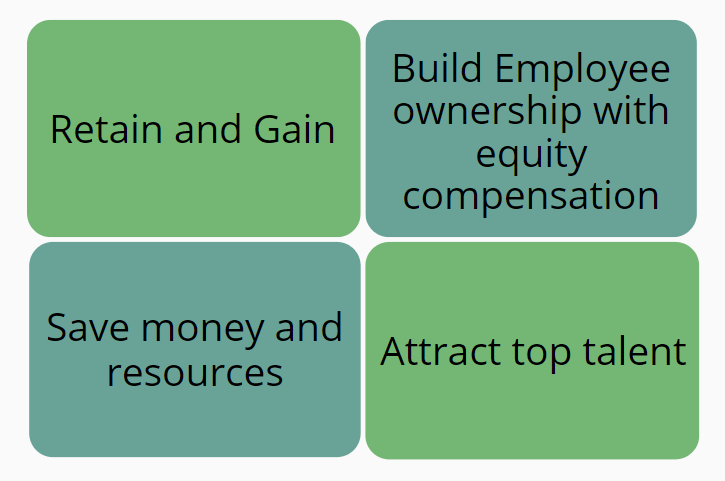You devoted time and expense to training and developing your employees and put them in a position to succeed. One day, they announce that they are leaving for a competitor. This is a nightmare for any business.
This is particularly true when it comes to executives or high-potential talent. So, are there any effective approaches in which your key employees will choose to stay rather than leave when they receive an attractive offer from elsewhere?
A short answer to it: Golden handcuffs
What are golden handcuffs?
Golden handcuffs are a collection of deferred incentives that management provides employees to encourage them to stay with their company for the long term.
They are commonly used in employee management when employers want to retain high-value employees or executives who excel in their work, especially in any high-paying career, e.g. tech and financial industries.
Types of golden handcuffs:
There’re different types of golden handcuffs that employers can use to incentivize their employees such as bonuses, a vacation house, loan repayment benefits, pensions, and any types of employee equity.
By valuing the perks carefully with an employee’s need, you can effectively discourage your staff from leaving for another company.
How do golden handcuffs work? (+ examples)
Golden handcuffs work by offering a financial benefit that executives have to provide a certain number of years of service to receive. For example, stock options with a 5-year cliff vesting schedule incentivize them to stick around for at least 5 years to receive the full benefits of 100% vested options. Learn more about the vesting schedule here.
Another type is to allow executives to receive a benefit but they will need to pay it back if they leave before the agreed period. For example, if an executive receives tuition reimbursements, they’ll likely need to pay them back if they don’t stay for the agreed period of them.
Real-life golden handcuffs examples:
Apple is more interested in hiring technical staff than sales or support staff. These technical employees often get golden handcuffs or stock awards that vest over 3 or 4 years. Tesla employees are also offered stock awards as ‘’golden handcuffs’’ to keep the staff from leaving.
Golden handcuffs Pros & Cons
There are benefits for both your company and those employees targeted in this type of executive compensation plan. But, if “golden handcuffs” aren’t well implemented, it’ll result in a lose-lose scenario. Let’s see their pros and cons:

1. Retain and gain (twice)
When companies lose key personnel to a competitor, it is a double blow – the company loses a human asset and the competitor gains a top talent, along with all their expertise and experience.
So, when you retain those individuals, not only do you continue to benefit from their high performance, but you deny your competitor access to that same excellence.
2. Save money and resources
With effective “golden handcuffs”, it is far less likely that employees will leave, which in turn means that the company doesn’t have to face the time-consuming and expensive recruitment and training process.
3. Build Employee ownership with equity compensation
When you provide equity compensation as a type of golden handcuffs, you give some of your ownership in your company to your employees. Employee ownership allows employees to have a feeling of team spirit – they’re not just employees, they’re employee-owners and can often make valuable contributions to the company’s direction through shareholder voting.
4. Attract top talent
These incentives are not just about retaining existing staff; they can also be used to attract top talent. If a company is looking to recruit a proven candidate to a senior position, adding an attractive “golden handcuffs” program can be a decisive factor.
But.. what happens if your employees feel locked and stuck?
You plan to provide your key employees with attractive benefits in exchange for their loyalty. But, if you intended to handcuff them or you didn’t consider their needs and the values of the perks offered, they’d feel trapped and disengaged.
A Gallup survey found that disengaged employees cost organizations 34%. So, It’s truly a lose-lose situation.
Create an effective golden handcuffs agreement
1. Bonuses are not always necessary
When it comes to golden handcuffs, large bonuses are one of the most common vehicles. But it doesn’t mean you have to use them. Again, you want to offer your key employees true and unique benefits in which they will be less tempted by an outside offer.
Many companies offer employees the same perks – cars, vacations, and hefty bonuses, so employees can easily leave their current company and get the same benefits somewhere else. (Source: Drew McLellan, CEO of Agency Management Institute)
2. Don’t assume. Listen to what your staff needs
There’s no one-size-fits-all solution because they likely want different things. So, the perks should be a customizable benefit to each person. For example, student loan repayment benefits would be ideal for young, high-value employees while an executive who is planning for retirement would be attracted to a good pension scheme.
So, take some time to listen and outline an agreement to help them achieve their goals.
Creating a customizable plan for each person can increase HR’s workload. But with an automated software program, you can easily set up, track and manage each employee’s equity award. Speak with us today. We can help you manage your golden handcuffs.
3. Align employee retention with business goals
Building a golden handcuffs strategy isn’t all about throwing endless perks. Without carefully considering your business goals, they’ll do little to help your company grow.
For example, you’ll need to think about who should receive the incentives, what vehicles should be used (e.g. stock options are ideal if employee ownership matters to you), what competitors are offering, and when should they fully receive the incentives.
So, always think about if your agreement works together with your goals.
4. Think beyond golden handcuffs
It’s not all about monetary compensation.
People stay loyal to a company for all sorts of reasons – a healthy work and life balance, a great manager, company culture, career ladders, flexible work arrangements, the job fits their values, etc.
So, creating a place where people feel good about coming to work by making each employee valuable, safe and engaged is your ultimate goal.
Contact Global Shares
Golden handcuffs are an effective tool to improve employee loyalty if you use them properly.
If you decided to include stock options or any other forms of equity in the agreement, you might need an effective equity compensation program to help you manage each employee’s equity awards.
At Global shares, we provide award-winning equity compensation plan administration. From software and administration to compliance and reporting – we can make equity management simplified.
Please Note: This publication contains general information only and J.P. Morgan Workplace Solutions is not, through this article, issuing any advice, be it legal, financial, tax-related, business-related, professional or other. J.P. Morgan Workplace Solutions’ Insights is not a substitute for professional advice and should not be used as such. J.P. Morgan Workplace Solutions does not assume any liability for reliance on the information provided herein.



